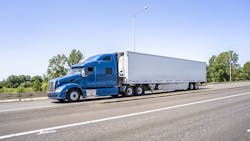Fleet Advantage reveals latest benchmark survey results
Fleet Advantage has revealed the results of its latest fleet industry benchmarking survey showing how trends in fuel economy, maintenance, environmental concerns, and procurement strategies have changed since last year.
Procurement strategies and lease structure are top-of-mind
According to this year’s survey, 41% of fleet executives say the supply of new trucks and inventory challenges have altered their truck procurement plans due to lead times. Seventeen percent have begun to identify alternate procurement strategies in the acquisition of new trucks. Another 17% say the inventory challenges mean they may hold onto current trucks even longer than normal, which may be detrimental to their Total Cost of Ownership (TCO).
Thirty-one percent of respondents said they are leasing their trucks, significantly up from last year when only 14% of fleet executives said they were leasing. However, lease structure is a major area of concern for many as 28% are in an unbundled lease agreement and “see greater value on flexible fuel and maintenance costs”. This compares to 20% who say they are locked in a full-service lease with some saying they are “trying to escape the contract because of inflexible costs on fuel and maintenance.”
Lastly, 68% stated they are monitoring possible tax policy changes as part of their procurement strategies.
Maintenance, fuel economy, and driver retention remain biggest motivators for truck replacement
Sixty-four percent of fleet executives report costs associated with maintenance and repair (M&R), and 44% say improved fuel economy are the leading motivators for truck replacement. This is similar to last year when 55% of fleet executives cited M&R and 47% said improved fuel economy. This is interesting since 17% of fleets are considering holding onto their older, more inefficient trucks even longer than normal because of the current inventory challenges of new trucks as previously mentioned.
A new comment in this year’s survey regarding pandemic-related business challenges showed that for 31% of fleet executives, their biggest motivator for procurement was to right-size the number of trucks in their fleet to align with economic conditions, which changed rapidly during the pandemic in 2020. Other motivators included more safety features added by OEMs, the importance of improved corporate image, and the conservation of natural resources/lower CO2 emissions through newer clean-diesel engines. This is reinforced in the National Private Truck Council’s (NPTC) 2021 Benchmarking Study which said 89% of fleets are investing in greening initiatives.
Furthermore, driver retention was the third-largest motivator to replace aging trucks, and in addition to new equipment, compensation and driver benefits were also listed as beneficial for driver retention.
Electrification remains in the distance for fleets
The majority of fleets continue to believe clean-diesel technology remains more viable for emissions reduction than a move to electric vehicles. More than half of fleet respondents (54%) said they may consider electric class-8 trucks for over-the-road between 5-10 years from now, and only 3% of fleet executives are currently procuring electric trucks today. A year ago, 30% of respondents said they do not see electric trucks widely in service for another 10 years. Regarding autonomous trucks, 53% said they don’t see these widely in use for another 10 years (62% last year).
“Our annual benchmarking study provides us and the industry with a close look at the issues that are most important to fleet executives today and the decisions that are helping to shape their business strategies,” said John Flynn, CEO of Fleet Advantage. “This year’s study shows that procurement strategies, an emphasis on unbundled leasing, specific replacement motivators, and a stronger focus on environmental, social, governance (ESG) are all critical for fleets today.”
